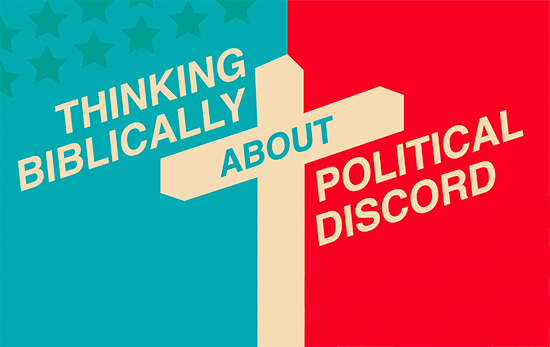
October-November 2022
Looking Back...
Looking Forward
------------------
|





Thinking Biblically About Political Discord
By Matthew Steven Bracey
Do you find yourself frustrated and exhausted by political discourse—even among Christians? Are you concerned that some regard themselves first as Democrats, Republicans, or Independents, and second as Christians? Few things create strife like conversations about faith and politics. For that reason, many learned as children not to discuss politics or religion in polite company. That advice is helpful only to a point. Cultivating a Christian worldview requires we think biblically about all of life, including politics (and not just around election time). With that in mind, consider four practical principles for political discourse.
Surveying the Landscape
Regarding faith and politics, we usually encounter two types of people. The first advocates for one party over others: no party is perfect, but one party aligns itself more closely with truth. At the very least, they hold, one party is less hostile to Kingdom values or less harmful to Kingdom witness than others. Politics is an inevitable part of life.
The second exhibits suspicion toward Christians tied too closely to political parties, whether left, right, or middle: culture wars are not won at the voting booth but in the church pew and pulpit. Party politics often revolve around special interests, they explain, and political discourse contributes to discord. In contrast, God’s Kingdom is the multicultural, multiethnic, multinational Body of Christ.
In many instances, this divide manifests itself among the generations. Baby Boomers (born 1946–64) often display enthusiasm for one political party over another. In contrast, Millennials (born 1981–96) frequently express misgivings about previous generations’ approach to faith and politics. Generation X (born 1961–81) sometimes splits the middle of these two approaches. My experience in higher education suggests the jury is still out on Generation Z (born 1995–2010). Even if specific groups defy broad generational characterization, this basic narrative still describes a commonly observed phenomenon. Amid this scuffle, what is a proper stance toward politics?
The Bible and the State 101
God is the sovereign King of the cosmos. Nothing in the heavens or on the earth escapes His care, including affairs of state. In fact, God works in them, through them, or despite them. But He does not ignore them. Neither should we. The political sphere is bustling with divine activity, and believers should engage it, even though it is fraught with complications and disappointments.
Biblical figures offer a helpful example. Again and again, God fulfilled His purposes through His children’s interactions with the nations, as evident in Egypt, Babylon, Persia, and Rome. Political and religious leaders alike followed God’s leading in this area, whether Joseph, Moses, Daniel, Esther, Ezra, or Paul. The rulers with whom they interacted were wicked people, yet God’s children did not evade God’s call to contend with them.
In Matthew 22, Jesus said to render to Caesar what is Caesar’s and to God what is God’s. The political sphere plays an important role in the work of God. Present in Jesus’ statement is a disposition of respect and reverence. In Romans 13, Paul explained God ordains a state ruler as His minister to encourage good and discourage bad. When a government does not fulfill these ends, it fails in its prescribed purpose.
Consider the United States as an example: it performs many rightful actions we take for granted, such as incentivizing religious and charitable activities with nonprofit benefits and deterring criminal activity with penalties. On the other hand, it also acts beyond its proper function when it celebrates sexual sin and punishes actions and even rhetoric to the contrary.
Significantly, Jesus and Paul each engaged in political discourse and set forth principles while being fully aware of the evil practices of the Roman Empire. Thus, corruption in politics is not a license to disregard responsible engagement. In a fallen world where God’s common grace abides, governments will contain both good and bad elements. Jesus calls believers to be separate from the world while also calling them to go into the world. He sends us as salt and light to a decaying world and a dark culture. Because Christ’s redemption of a fallen world is truly cosmic, He sends us into the spheres of culture, politics included. As a result, what ought Christian engagement in political discourse look like?
Four Principles for Political Discourse
1. We should not retreat. We must not withdraw from the conversation. We cannot forsake politics because we cannot forsake culture. Although political discourse may (and does) try us, it should never cause us to retreat because our witness makes a difference.
Christians may rightfully feel discouragement at the current state of political discourse. The horizon may be lined with dark clouds. Even so, Christians cannot run for shelter from the raging storm. If ever the dark world needed the light of Christian witness, it is amid the storm. Withdrawal would have dire consequences.
The prophetic witness of the Christian, even if difficult, is important. We must not remove our Kingdom witness from the public square. Rather, we should take our values into the public square. We must stand—full of grace and truth—for a godly vision of things like life, marriage, and religious liberty. Depending on the issues, this stance will mean we champion or oppose one political party over another, not because of political policies per se, but because the Bible enjoins believers to stand for truth in every area of life.
Thinking biblically and thinking politically are not mutually exclusive dispositions. At issue is not whether we should think in terms of politics, just as the issue is not whether we should think in terms of the arts, education, or the family. At issue is how we think of these spheres: whether the Bible informs our worldview on these issues.
2. We should repent of our respective sins: idolatry, apathy, pride. Unfortunately, some people put political convictions above their Christian ones. Lest we think these are new challenges, Reinhold Niebuhr wrote in the 1950s: “The tendency to equate our political with our Christian convictions causes politics to generate idolatry.” Such persons should repent of their idolatry. The Bible stands above politics, not politics above the Bible.
Other understandings of the Christian life practically exclude political discourse altogether. Niebuhr also criticized those who “find no relevance at all between our faith and our political actions. This answer is wrong because it denies the seriousness of our political decisions and obscures our Christian responsibilities for the good order and justice of our civil community.”
If the first group should repent of its idolatry, this second group should repent of apathy. The Christian worldview is for all of life. Following Christ involves taking every thought captive. The state fosters order and justice. Thus, in pointing a way forward, we should not let the proverbial pendulum swing to either extreme.
Still others legitimately think in terms of the Bible first and politics second, but we interpret them vice versa. In that case, their manner of discourse usually contains some quality, such as an unbending dogmatism or pompous self-righteousness that is antithetical to a gospel of grace. Such persons, who exist on both sides of the political aisle, should repent of their pride.
When political values conflict with biblical values, we must follow Scripture. However, when political values concur with biblical values, we may confidently promote and defend those political positions. Such cases are not evidence of politics first and the Bible second. They are recognition and celebration of the fact that state leaders are fulfilling their rightful Romans 13 function.
3. We should grant grace to one another when we disagree. Sometimes, the difficulty is not that we are thinking first in terms of politics and second in terms of Christianity but only that we interpret one another as doing so. Legitimate differences of opinion may not amount to political idolatry but are simply differences in how we interpret and/or apply the biblical text. Notwithstanding these complicated contingencies, we should not forsake the complex work of political discourse and engagement.
In these instances, we should extend grace to those with whom we disagree rather than heaping judgment on them. Still, we should seek to persuade one another of what we believe is right. Whatever our personal leanings, we tend to view likeminded people as kind and reasonable and the contrary-minded as obnoxious and pigheaded. We should avoid that mistake. Every group contains those who are courteous and others who are rude. We should learn from the best of one another in the grace and humility of Christ.
4. We should engage in political discourse in a manner consistent with the Spirit of Christ. Those tempted to place too much hope in party politics should remember God’s Kingdom is separate from man’s kingdom. Those tempted to place too little concern in party politics should remember that God’s Kingdom is not mutually exclusive to man’s kingdom. We should not respond to others’ unbridled fervor or obnoxious sanctimony with apathy. Instead, we should give leadership to a difficult area; otherwise, someone else will (and not for the better). Like Jesus and Paul, we should steward the call honorably and respectfully.
No political party or leader is entirely good or bad, correct or incorrect. Instead, they are a mixture. At the same time, some will align their positions more closely to biblical truth. When they do, we should not feel guilty for supporting them, and when they do not, we should not feel guilty for criticizing them. However, we should be “equal opportunity offenders.” For example, some people draw attention to Democrats when they do good but not to Republicans, just as they will draw attention to Republicans when they do bad but not to Democrats. Such is evidence of thinking politically rather than biblically.
The sovereign God works amid political realities for the causes of freedom, justice, and truth. Ultimately, neither our actions nor our inactions occur in a vacuum but instead contribute to political reality, whether we like it or not. In a democratic republic, such as the United States, citizens contribute to the rule of the state through their involvement. God ordains you and me to give righteous leadership to this area.
Likely, most of us will never run for political office. But we must know and discuss the issues, always in a manner that displays the fruit of the Spirit and working toward the common good in the public-political square.
About the Author: Matthew Bracey (M.T.S., J.D.) works at Welch College, where he serves as vice provost for academic administration and a faculty member, teaching courses in history, law, and theology. He is a co-founder and senior editor of The Helwys Society Forum. This article is an adaptation of an article that appeared first in The Brink magazine (Winter 2018–19): 2–16.
|
|

